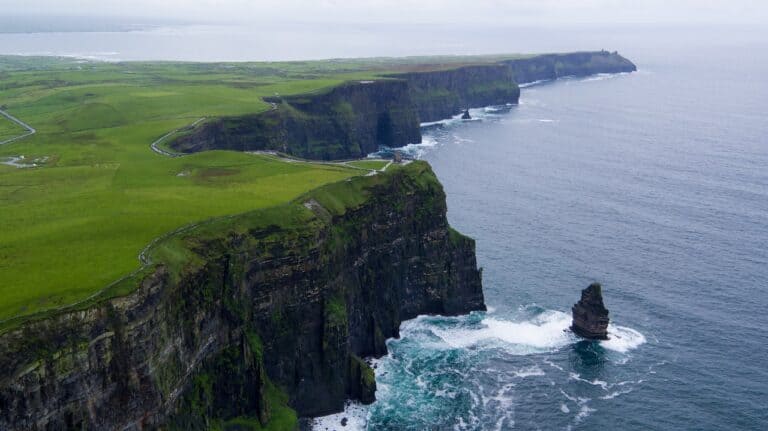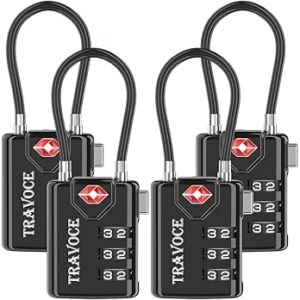Plug For Ireland: What You Need To Know

What is the plug for Ireland? Before you travel, check the information below to make sure your electronic devices are compatible with the outlet type and voltage.
Electrical Summary
Plug Compatibility: Type G
Voltage: 230V (I.S. 401)
Frequency: 50 Hz
Type G

Can North Americans use Electronics in Ireland without an Adapter?
No! North Americans will need an adapter for the outlets and a transformer for the voltage when traveling to Ireland. North Americans device plugs will not work with the outlet types in Ireland. Also, the voltage in Ireland is different from North American voltages.
Can Europeans use Electronics in Ireland without an adapter?
Europeans do not need a transformer when traveling to Ireland. The voltage in Ireland is the same as in Europe. However, most Europeans will need a travel adapter when traveling to Ireland.
What Outlet does Ireland Use?
Type G

Type G plug sockets have three rectangular pins and a grounding pin. These plugs are typically used with devices that have a voltage of 230V.
Recommended Products:
Should I use a VPN when traveling?
YES! Using a VPN when traveling is highly recommended to protect your online privacy and security. Public Wi-Fi networks in hotels, airports, and cafés are often unsecured, making you vulnerable to hackers and data theft. A VPN encrypts your internet connection, safeguarding sensitive information like passwords and banking details. It also allows you to bypass geo-restrictions, granting access to streaming services and websites that may be blocked in certain countries. Additionally, a VPN helps prevent government surveillance and ISP tracking. For a seamless and secure browsing experience while traveling, choose a reliable VPN with fast speeds and strong encryption.
Ireland Travel Essentials:
Is it safe to drink water in Ireland?
We recommend always packing a filtered water bottle when traveling!
Travel Essentials
Be sure to check our list of travel essentials before your trip!
Should I get travel insurance when traveling to Ireland?
It is generally recommended to get travel insurance when traveling to a different country. Travel insurance can provide financial protection and peace of mind in case of unexpected events, such as medical emergencies, trip cancellations, lost or stolen baggage, or other travel-related mishaps.
Travel insurance can cover various expenses related to your trip, such as medical expenses, emergency medical transportation, trip cancellation or interruption, lost or stolen baggage or personal belongings, and other travel-related expenses.
Before purchasing travel insurance, it’s important to carefully review the policy details, including the coverage limits, exclusions, and any applicable deductibles or copays. You should also make sure that the policy covers any activities or destinations that you plan to participate in or visit during your trip. Click here to price for Travel Insurance for Ireland
Frequent Questions
What is Ireland known for?
Ireland is known for its stunning green landscapes, rich cultural heritage, and friendly locals. It is famous for historic castles, traditional music, and folklore, including legends of leprechauns and the Blarney Stone. Ireland is also known for its contributions to literature, with writers like James Joyce and W.B. Yeats, and for iconic products like Guinness beer and Irish whiskey.
Where is Ireland located?
Ireland is located in northwestern Europe and occupies most of the island of Ireland, west of Great Britain. It shares a border with Northern Ireland, which is part of the United Kingdom. The country is surrounded by the Atlantic Ocean, the Irish Sea, and the Celtic Sea, and is known for its rugged coastline and lush countryside.
What is the capital of Ireland?
The capital of Ireland is Dublin, situated on the east coast along the Irish Sea. Dublin is the largest city in the country and serves as the political, cultural, and economic center. It is home to historic landmarks like Trinity College, Dublin Castle, and the Guinness Storehouse, as well as a thriving arts and music scene.
What language is spoken in Ireland?
The official languages of Ireland are Irish (Gaeilge) and English. English is the most widely spoken language in daily life, while Irish is taught in schools and used in certain regions known as the Gaeltacht. Many road signs and public documents are bilingual, and there is growing interest in preserving and promoting the Irish language. Grab an Irish (Gaeilge) phrasebook for your trip.
What currency is used in Ireland?
Ireland uses the Euro (EUR, €) as its official currency. This distinguishes it from Northern Ireland, which uses the British Pound. Credit cards and contactless payments are widely accepted throughout the country, and ATMs are readily available in cities and towns. Get great rates on currency transfers with Wise
Is Ireland safe to visit?
Ireland is considered one of the safest countries to visit in Europe. It has a low crime rate, and violent crime is rare. Travelers can feel secure exploring both urban and rural areas, but as with any destination, it is wise to stay aware of your surroundings and take standard precautions, especially in busy tourist spots.
What is the weather like in Ireland?
Ireland has a temperate maritime climate with mild temperatures and frequent rainfall throughout the year. Summers are generally cool and pleasant, while winters are mild with occasional frost. The weather can be unpredictable, so it’s best to pack layers and be prepared for rain at any time of year.
What are the best places to visit in Ireland?
Top places to visit in Ireland include the Cliffs of Moher, the Ring of Kerry, and the Wild Atlantic Way for breathtaking coastal views. Dublin offers a mix of history and modern culture, while Galway is known for its lively atmosphere and traditional music. Other highlights include the Giant’s Causeway in Northern Ireland, the Aran Islands, and historic sites like Newgrange and Glendalough.
What is traditional Irish food?
Traditional Irish food is hearty and comforting, often featuring ingredients like potatoes, meat, and root vegetables. Popular dishes include Irish stew, boxty (potato pancakes), soda bread, and colcannon (mashed potatoes with cabbage or kale). Irish breakfasts are also well-known for their generous portions and variety of items like sausages, black pudding, and eggs.
How expensive is Ireland to visit?
Ireland can be a moderately to highly priced destination, especially in major cities like Dublin. However, there are plenty of ways to travel on a budget, such as staying in guesthouses or hostels, eating at local pubs, and using public transportation. Rural areas and smaller towns often offer better value while still showcasing the beauty and charm of Ireland.
Travel Summary
The capital city of Dublin is a vibrant city with a rich cultural heritage. Visitors can explore the city’s many landmarks, such as Dublin Castle, Trinity College, and the Guinness Storehouse, which offers a tour of the famous brewery and a pint of the iconic Irish stout.
Ireland is also known for its stunning natural beauty, with rolling green hills, rugged coastline, and stunning lakes and rivers. Visitors can explore the island’s many national parks, such as Killarney National Park and the Wicklow Mountains National Park, which offer miles of hiking trails and stunning vistas.
The island is also rich in history, with ancient ruins, castles, and churches scattered throughout the countryside. Visitors can explore sites such as the ancient passage tombs at Newgrange, the imposing Rock of Cashel, and the Blarney Castle, where they can kiss the famous Blarney Stone and receive the gift of eloquence.
For those looking for outdoor adventure, Ireland offers plenty of options, including hiking, cycling, fishing, and golfing. The island is also a popular destination for water sports, such as surfing, kayaking, and sailing.
Finally, no trip to Ireland would be complete without sampling the island’s delicious cuisine, which features fresh seafood, traditional Irish stews, and hearty pub fare. Visitors can also sample the famous Irish whiskey, with distilleries such as Jameson and Bushmills offering tours and tastings.
Overall, Ireland is a destination that offers a perfect mix of natural beauty, rich history, and warm hospitality. It’s a perfect destination for anyone looking to experience the beauty and charm of the Emerald Isle.
Check out our Countries page for more info on countries like the Austria, Germany, United Kingdom, France, Spain, Greece, Portugal, Isle of Man





